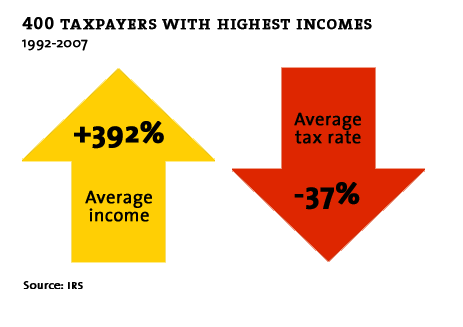The rise of the plutocrats and the death of fiscal democracy

It is astonishing that there has been so little debate on Irish tax policy up to now, given that we have one of the most aggressive low-tax regimes in Europe. By Aidan Regan.
The most effective way to embed economic conservatism and undermine the fiscal capacity of the state is through a public policy regime of long term tax cuts. This is precisely what has occurred in the USA since the late 1970s and Ireland since the early 1990s. The primary mechanism for the redistribution of wealth to the rich has been changes in taxation. And over the past 30 years taxes on the rich have fallen dramatically.
One third of the total gains in income share for the top 0.1% in America can be explained by tax cuts benefiting the rich.
All of the progressive social policies we associate with democracy are dependent upon the capacity of the state to raise taxes for public consumption goods.
Since the late 1980s this fiscal capacity has been slowly eroding across Europe and the USA. Tax cuts for the rich under successive Republican and Democrat governments in the US have contributed to the explosion of income inequality. This has become a major topic of discussion, research and politics across US society. Why has the same not occurred in Ireland and Europe?
It is astonishing that whilst Ireland is in the grips of an IMF financial rescue package and pursuing unprecedented spending cuts in health, education, community and social welfare, there is zero discussion on tax policy.
This is despite the fact that Ireland has instituted one of the most aggressive low-tax regimes in Europe. We should be thankful to Sarkozy and Merkel for making Ireland’s corporate tax rate a topic of discussion. At least it draws attention to the wider public policy regime of taxing capital.
Capital gains and effective corporate tax rates in Ireland are significantly below the Eurozone average; employers pay less in social insurance contributions than in any other Eurozone country; and income taxes have been narrowed to 50% of the population. None of this came about by chance - they were public policy decisions.
The Irish Government has no interest in radically reforming the fiscal capacity of the State because it has caught the austerity fever; an obsessive compulsive disorder that is rapidly spreading across western capitalist societies. But the problem is deeper than this and elections won’t change a thing.
Why? Because politics is organised combat. Winning requires organisation, duration, and focus. The rich are organised and focused. The rest of us are not. Jacob Hacker and Paul Pierson (2010) call this “winner takes all politics”. The electoral spectacle is a sideshow to the realpolitik of private lobbying and organised interest groups.
The number of corporations with lobbyists in Washington grew from 120 in 1971 to over 2,445 in the late 1980s, not to mention the increase in the collective capacity of employers such as the American Chamber of Commerce and Business Roundtable to organise and influence public policy.
Between 1999 and 2009 the financial industry spent $3.5 billion on lobbying and $2.2 billion on campaign donations (Callinicos, 2012).
The rich influence government in such a way to protect and expand their own influence. This is called a plutocracy. Yet we are still convinced that parliament has the capacity to govern autonomously from the rich and powerful. They don’t. The tug of war currently taking place between sovereign democratic states and international finance markets illustrates this.
Political commentators and analysts will argue that the low tax regime that favors the rich is the outcome of electoral preferences. It is not. Almost every study in the US and Europe shows that the electorate have a preference for higher taxes on the rich and significantly more redistribution than is currently in place. There is no shortage of economic resources in Ireland or Europe. They are just concentrated in the hands of those with significant market bargaining power.
Plutocrats are in the process of drowning fiscal democracy. {jathumbnailoff}
Image top: Mother Jones.
